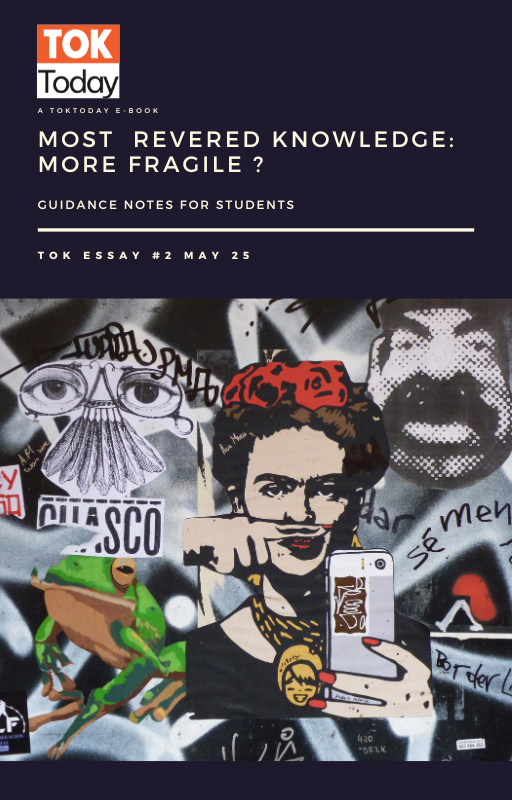How can Foucault help us with ToK Essay#2 May 25 (Fragile revered knowledge) ?
I recently read Michel Foucault’s amazing essay “What is an author?”. As I read my brain was pinging “that ToK essay on Fragile Knowledge, this is that ToK Essay on fragile knowledge !”.
So here, I’ve written some of my thoughts on how we can use Foucault's ideas in “What is an Author?” to help us to answer the question of whether our most revered knowledge is more fragile than we assume.
Before we dive in please let me make it clear that I don’t teach Foucault to ToK students, and I wouldn’t recommend that ToK students try to read any of Foucault’s work. This post is more directed to ToK teachers, it’s probably more for the post-modernist inclined ToK teacher.
Starting points:
We tend to think of knowledge as having “authors”: e.g. Shakespeare’s plays, Darwin’s theory of Survival of The Fittest, Newton’s Laws of motions etc.
The process by which we attribute / decide who is the author, and the effects of that process, is called “authorship” by Foucault.
I propose that authorship exists because our knowledge (esp, revered knowledge) is more fragile than we assume. This is why:
In What is an Author? Foucault explores the uncertainties surrounding the concept of authorship and its implications for how we understand knowledge. He argues that the author is not merely a creator of texts, but a function through which discourse is organised and classified. This notion challenges traditional ideas of authorship, where knowledge is seen as fixed and authoritative. Instead, Foucault suggests that the "author-function" can shape and limit how we view knowledge, making it more fragile than we might assume.
Foucault's analysis is that the role of the author is neither neutral nor stable. The concept of an author leads us to edit, serialise, and classify knowledge. It determines what we consider to be legitimate, and important, within a genre / discipline / AoK. For example, by attributing ideas or works to a specific author, we often assign them a value based on their name, status, or historical importance. This has two implications in terms of the fragility of knowledge. Firstly, it allows us to consolidate, or strengthen, otherwise disparate (“fragile”) knowledge by grouping it, and giving it a label (often of status, maybe reverentially). Secondly, it means that knowledge becomes closely tied to the authority of the author, rather than its content alone. However, knowledge can be fragile when new interpretations, or doubts about authenticity, or shifts in cultural values arise.
One significant point Foucault raises is how the author's name operates as more than just a label. The author's name becomes a category that shapes the interpretation of the text, assigning it a place within cultural or intellectual frameworks. This process of attribution can either elevate (make “revered”) or diminish the knowledge contained within the text, depending on how the author is perceived. The implication being that without this label the knowledge could be described as “fragile”. Further, if an author’s legitimacy is questioned or the context in which their work was created changes, the knowledge attached to them may also lose its credibility. In this way, the concept of authorship, which once served to stabilise and legitimise knowledge, can introduce fragility by making knowledge dependent on the reputation and interpretation of the author.
Foucault argues that the "author-function" changes over time and is shaped by social, cultural, and historical contexts. This means that what is considered revered knowledge in one period might be re-evaluated and challenged in another. For example, the work of authors from centuries ago may be reinterpreted based on contemporary values or discarded if their views no longer align with current social norms. This dynamic nature of authorship highlights how fragile knowledge can be when tied to the concept of the author.
Authorship influences, and arguably, limits our interpretation of knowledge. Subsequently this can lead to bias in the perspectives that we develop about knowledge. As such, authorship moves us away from reverence of knowledge derived from desirable characteristics based on more objective universal features. It moves us towards a more subjective (and arguably fragile) interpretation of knowledge based upon the attribution of the production of that knowledge.
Foucault’s argument about authorship shows that the ways in which we organise knowledge can also indicate the fragility of that knowledge. By editing, serialising, and classifying knowledge through the lens of the author, we risk limiting our understanding and making knowledge dependent on changing interpretations of authorship.We are left with a tension between the semiotic or structural characteristics / functions of knowledge vs the labelled characteristics of knowledge.
How do I translate this into classroom teaching…, - watch this space, coming soon !
Get STUDENT FRIENDLY notes for Essay #2 M25!
These notes are:
very student friendly (unlike the above blogpost).
contain knowledge claims, evaluation points, examples and implications.
include a proposed structure.
include suggestions for Introduction and Conclusion sections.
5,500 words.
Stay Toktastic my friends,
Daniel, Lisbon, September 2024
References
Foucault, M. (1979). Authorship: What is an Author? Screen, 20(1), 13–34. https://doi.org/10.1093/screen/20.1.13


